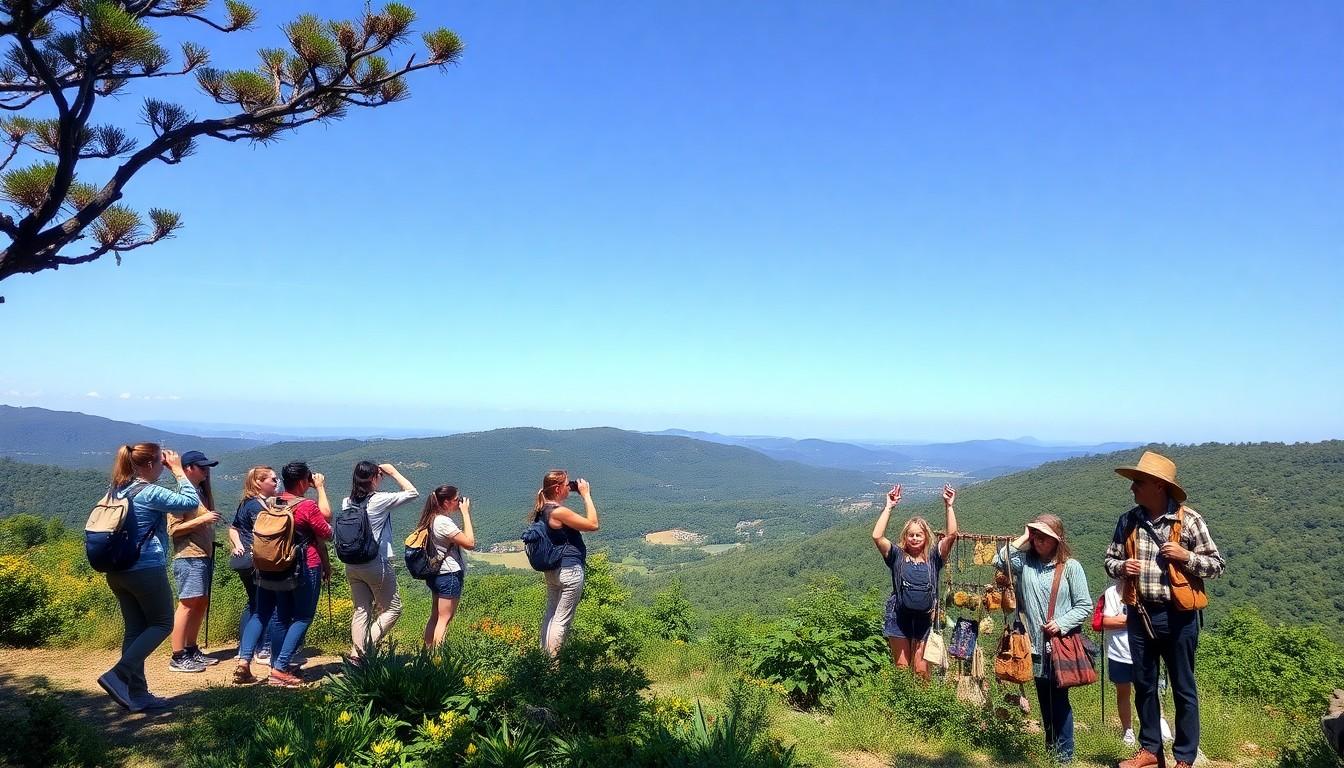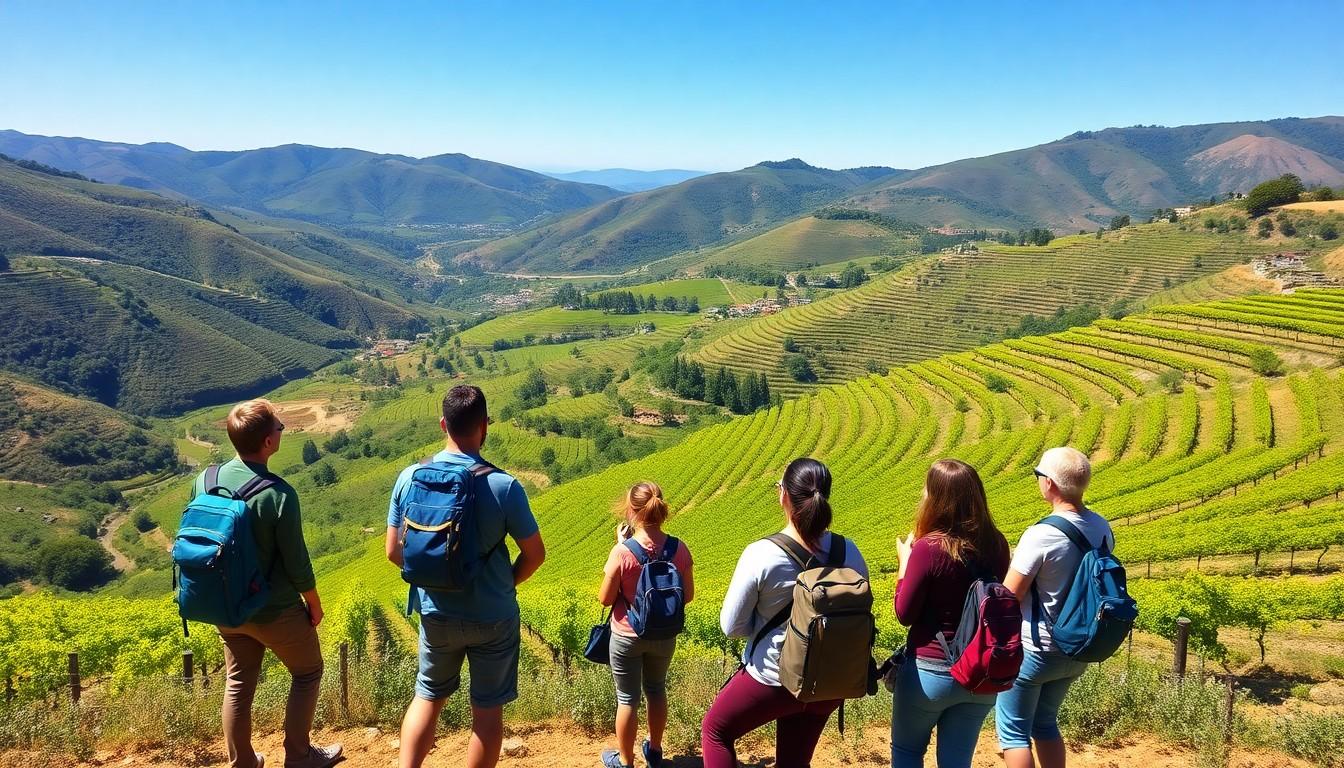Portugal’s calling, and it’s not just for pastel de nata and port wine. This sun-kissed gem on the Iberian Peninsula is fast becoming a hotspot for eco-tourism, where nature lovers can frolic guilt-free in its stunning landscapes. From the rugged cliffs of the Algarve to the lush vineyards of the Douro Valley, Portugal offers a playground for those who want to sip wine while saving the planet.
Imagine hiking through ancient forests or kayaking in crystal-clear waters, all while leaving a lighter footprint. With its commitment to sustainability and eco-friendly practices, Portugal proves that you can have your cake and eat it too—just make sure it’s organic! So grab your reusable water bottle and get ready to explore the beauty of eco-tourism in Portugal, where every adventure is a step toward a greener future.
Eco Tourism Portugal
Portugal has emerged as a top eco-tourism destination, attracting travelers with its rich biodiversity and stunning natural landscapes. Conservation efforts play a crucial role in preserving unique habitats, which hosts a variety of flora and fauna. Visitors enjoy numerous outdoor activities, including hiking in the dramatic Douro Valley and exploring the serene beaches of the Algarve.
Local communities actively participate in eco-friendly initiatives, promoting sustainable practices that benefit the environment. Engaging with locals offers travelers an authentic experience, showcasing traditional crafts, sustainable farming, and region-specific cuisines. Regional parks, like Peneda-Gerês, provide ample opportunities for wildlife observation and trail walking.
Sustainable accommodations abound, ranging from eco-lodges to boutique hotels focused on minimizing their environmental impact. Travelers can find options that utilize renewable energy sources and support local artisans. Organic vineyard tours highlight sustainable wine production, allowing guests to taste while learning about eco-friendly practices.
Portugal’s commitment to preserving its natural beauty reflects broader trends in responsible tourism. Eco-tourists can explore the country’s vast national parks and reserves, promoting conservation awareness. Activities, such as birdwatching and marine reserve tours, further enhance visitors’ connections to the environment. Efforts to reduce plastic waste and increase recycling awareness are also gaining traction, showcasing a collective move toward sustainability.
Portugal not only offers exhilarating experiences but also fosters a mindset of environmental responsibility. Eco-tourism in Portugal thrives on the balance between adventure and conservation, inviting travelers to enjoy its beauty while contributing to a sustainable future.
Benefits of Eco Tourism

Eco-tourism in Portugal offers significant advantages both for the environment and the economy. Sustainable travel practices contribute to conservation efforts while supporting local communities.
Environmental Impact
Eco-tourism promotes environmental awareness and conservation. Visitors engage in activities that minimize their ecological footprint, such as hiking and birdwatching. Such engagement fosters appreciation for Portugal’s natural beauty. Conservation programs receive support through eco-tourists’ participation, which helps protect endemic species. Furthermore, eco-friendly accommodations often employ renewable energy sources and reduce waste. Travelers who choose sustainable paths contribute to maintaining pristine ecosystems and restoring habitats for future generations.
Economic Advantages
Eco-tourism generates revenue that directly benefits local communities. Increased visitor numbers lead to job creation in eco-friendly sectors, including hospitality and local crafts. Local farmers and artisans find opportunities through eco-tourism initiatives, enhancing the regional economy. Revenue from sustainable practices often supports community development projects as well. Tourists who seek authentic experiences tend to spend more on local cuisine, crafts, and tours. By prioritizing responsible tourism, Portugal strengthens its economy while preserving its environmental heritage.
Top Eco Tourism Destinations in Portugal
Portugal offers an array of eco-tourism destinations that showcase its natural beauty and commitment to sustainability.
National Parks and Natural Reserves
National parks and natural reserves in Portugal highlight the country’s rich biodiversity. Peneda-Gerês National Park features lush forests, cascading waterfalls, and diverse wildlife such as deer and wolves. Arrábida Natural Park boasts stunning coastal cliffs and vibrant marine life, attracting nature enthusiasts and photographers alike. The Ria Formosa Natural Park serves as a sanctuary for migratory birds, making it a prime location for birdwatching. Visitors can hike on designated trails, enjoying the tranquility of nature while supporting conservation efforts. Engaging in eco-friendly activities inside these protected areas helps maintain their ecological integrity.
Coastal Areas and Beaches
Portugal’s coastal areas and beaches deliver breathtaking views and opportunities for responsible tourism. The Algarve region is famous for its stunning cliffs and clear waters, perfect for kayaking and snorkeling. Alentejo’s coastline features pristine, unspoiled beaches, ideal for peaceful retreats. Praia da Marinha, consistently rated among the world’s best beaches, attracts eco-conscious tourists with its natural beauty and serene environment. Engaging in beach clean-ups and responsible fishing practices can enhance appreciation for the ocean’s health. Travelers can also enjoy local cuisine at beachfront restaurants, supporting sustainable fishing and agriculture initiatives while savoring fresh seafood.
Activities to Experience
Portugal offers numerous activities for eco-tourists, showcasing its natural beauty while promoting sustainability.
Hiking and Biking Trails
Hiking and biking trails abound across Portugal, guiding visitors through breathtaking landscapes. Douro Valley boasts scenic routes featuring terraced vineyards and dramatic river views. Paths in Sintra-Cascais Natural Park lead adventurers through lush forests and stunning cliffs. Trails for all skill levels exist, ensuring everyone finds a suitable route. Algarve provides coastal paths that reveal hidden beaches and rugged cliffs. Biking enthusiasts can explore routes in national parks like Peneda-Gerês, where diverse ecosystems thrive. Each trail encourages immersion in nature while practicing responsible travel.
Wildlife Watching
Wildlife watching opportunities highlight Portugal’s rich biodiversity. Ria Formosa Natural Park draws birdwatchers eager to spot migratory species in their habitats. Dolphins frequently grace the waters off the Algarve, offering unforgettable marine encounters. Exploring the forests of Peneda-Gerês reveals unique wildlife, including deer and rare bird species. Travelers might also discover diverse flora during guided nature walks, enhancing their understanding of local ecosystems. Preservation efforts ensure that these experiences support conservation initiatives and eco-friendly tourism. Ecotourists discover the intricate connections between wildlife and their environments while enjoying scenic views.
Sustainable Practices in Eco Tourism
Sustainable practices form the backbone of Portugal’s eco-tourism initiatives. These efforts focus on preserving natural resources while promoting responsible travel.
Local Communities Involvement
Local communities play a pivotal role in eco-tourism throughout Portugal. Residents actively engage in sustainable practices that support their traditional lifestyles. They offer authentic experiences, showcasing local crafts and cultural heritage. Programs that promote sustainable farming educate visitors about regional agriculture. By participating in these initiatives, travelers strengthen community ties and enhance economic resilience. Authenticity shines through local cuisine, where traditional recipes highlight the use of organic ingredients. This collaboration fosters a deeper understanding of Portugal’s culture while benefiting the environment.
Eco-Friendly Accommodations
Eco-friendly accommodations contribute significantly to sustainable tourism efforts in Portugal. Boutique hotels and eco-lodges prioritize environmental impact reduction through energy-efficient designs and renewable resources. Many facilities source local materials, supporting the regional economy. Guests often experience the charm of staying in structures that harmonize with their surroundings. Sustainable practices include water conservation and waste reduction, ensuring minimal ecological footprints. Organic farms onsite provide fresh produce, enhancing dining experiences with seasonal offerings. By choosing eco-friendly lodging, travelers make conscious decisions that impact Portugal’s natural beauty positively.
Commitment of Local Communities
Portugal stands at the forefront of eco-tourism with its breathtaking landscapes and dedication to sustainability. Travelers can explore its rich biodiversity while engaging in activities that respect the environment. By choosing eco-friendly options, visitors not only enjoy authentic experiences but also contribute to the preservation of Portugal’s natural heritage.
The commitment of local communities and sustainable accommodations enhances the eco-tourism experience, making it both rewarding and responsible. As more people seek to connect with nature in a meaningful way, Portugal’s eco-tourism sector will continue to thrive, offering a model for responsible travel that benefits both the environment and local economies.

